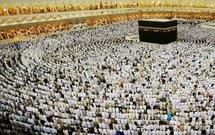 Monday coincided the beginning of the hajj, the annual pilgrimage that brings some 2 million Muslims from around the world to the Saudi city of Mecca. Saudi Arabia has been organizing the hajj for nearly the entire life span of King Abdullah bin Abdulaziz, the current 89-year-old "Custodian of the Two Holy Mosques," the title of Saudi monarchs, which grants them religious legitimacy throughout the Muslim world.
Monday coincided the beginning of the hajj, the annual pilgrimage that brings some 2 million Muslims from around the world to the Saudi city of Mecca. Saudi Arabia has been organizing the hajj for nearly the entire life span of King Abdullah bin Abdulaziz, the current 89-year-old "Custodian of the Two Holy Mosques," the title of Saudi monarchs, which grants them religious legitimacy throughout the Muslim world.
But this year's hajj finds its host country facing an unprecedented geopolitical challenge as the United States, the kingdom's main security guarantor, seeks a detente with the Riyadh's biggest adversary: Iran. It also comes as much of the Arab and Sunni world, which Saudi Arabia proclaims to lead, is in general disarray.
For a little over a quarter of a century, the Saudis have been worried about the hajj being used for political demonstrations, especially by Iran and its Arab Shia allies. Saudi concerns are based on past experience. During the hajj of 1987, Shia pilgrims staged demonstrations against the United States and Israel, leading to a crackdown by Saudi security forces that left at least 400 people dead, most of them Iranian pilgrims, and some 700 others wounded. This crackdown reflected negatively on the Saudi regime's standing in at home and in the region.
While the Iranians have not used the hajj to advance their geopolitical aims since that time, Saudi Arabia's concerns regarding Iran have only intensified in the subsequent years. Since the 9/11 attacks, Iranian regional influence has grown, especially with Iraq falling under Iran's sway. The Arab Spring brought some hope for the Saudis that if the Syrian regime could be toppled, the Iranian geopolitical march west could be halted and perhaps even reversed.
However, the Syrian situation no longer looks so advantageous to the Saudis, especially as the United States has shown that even if Damascus uses chemical weapons, Washington will not seek to topple it so much as do the minimum to restrain it and find an international method for managing it. Furthermore, the Sunni rebels in Syria are fighting among themselves, and their distraction is helping the pro-Iranian Syrian regime, which has been making key advances on the battlefield.
But nothing would be worse for the Saudis than if relations normalized between Washington and Tehran. Nearly 35 years of hostile relations between the United States and Iran have helped Saudi Arabia contain the Iranian threat. There are many obstacles to an American-Iranian rapprochement, but they mainly involve domestic politics within the United States and Iran.
Saudi Arabia is not in a position to leverage those to block the two countries from moving toward some semblance of normal ties. Therefore, Saudi foreign policy planners are operating under the assumption that the Iranians may soon no longer find themselves constrained by their current status as an international pariah.
The U.S.-Iranian thaw could not have come at a worse moment for the Saudis. The kingdom is going through a historic domestic transition as the third generation of the royal family will take over the throne in the coming years. While the kingdom has shown tremendous resistance to the Arab unrest elsewhere in the Middle East in recent years, it cannot permanently insulate itself from the phenomenon.
Saudi Arabia will also find that its effort to push hardline Salafist forces in Egypt toward democratic politics as a means to counter the Muslim Brotherhood has a cost. Riyadh cannot underwrite Salafist political parties in the region and hope that the world's largest concentration of Salafists, situated within its own borders, will continue to respect the royal family's right to rule.
Islam has long been a pillar of Saudi regime, and controlling the hajj helped facilitate the kingdom's role as the leader of Sunni Muslims and, by extension, the Islamic world. Today, the hajj takes place as Iran is preparing for talks with the United States that could remove a constraint on its ability to project power and amid Riyadh's struggles to stay ahead of developments in the Arab and Sunni world.
Courtesy : Stratfor (www.stratfor.com)